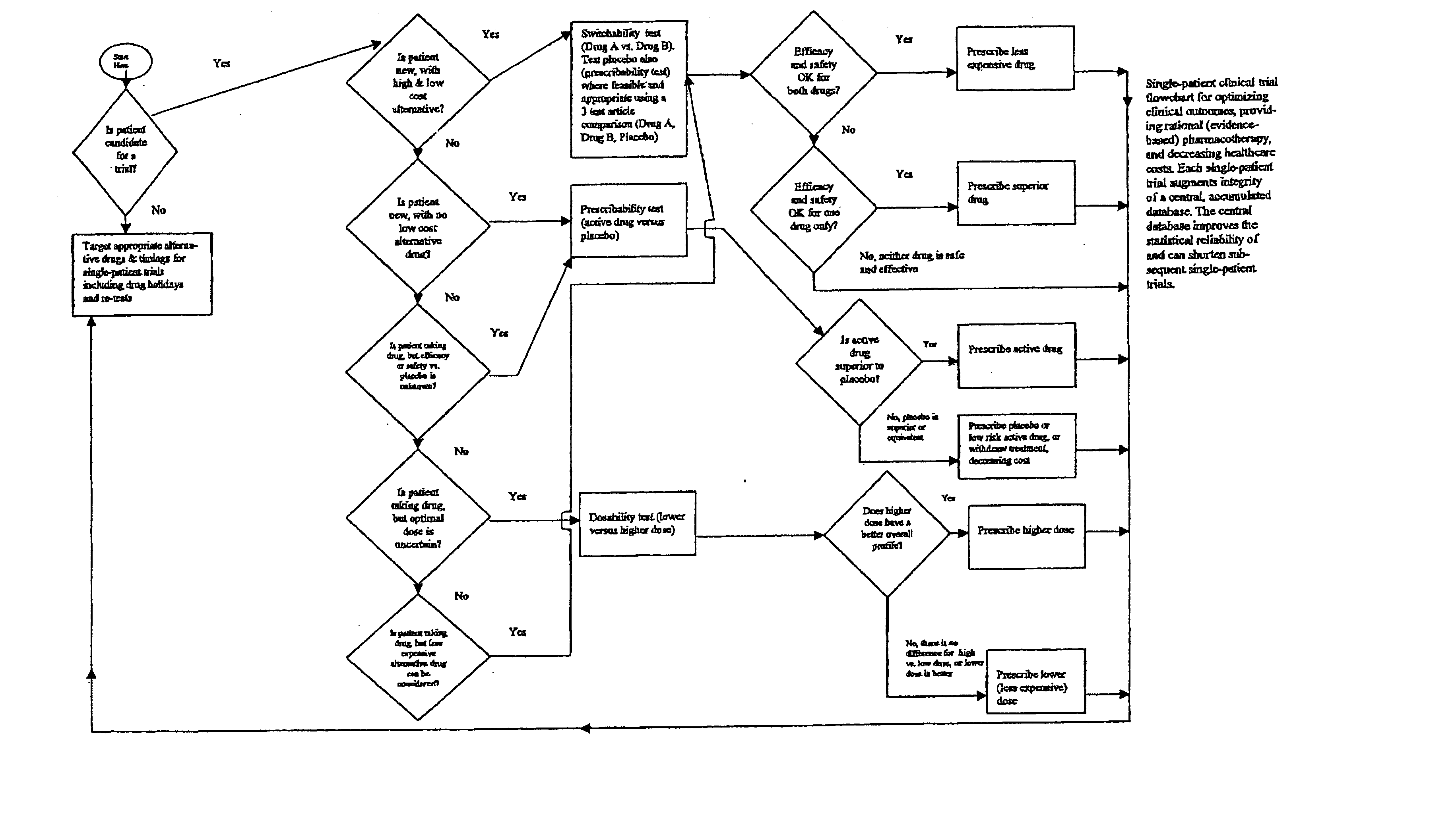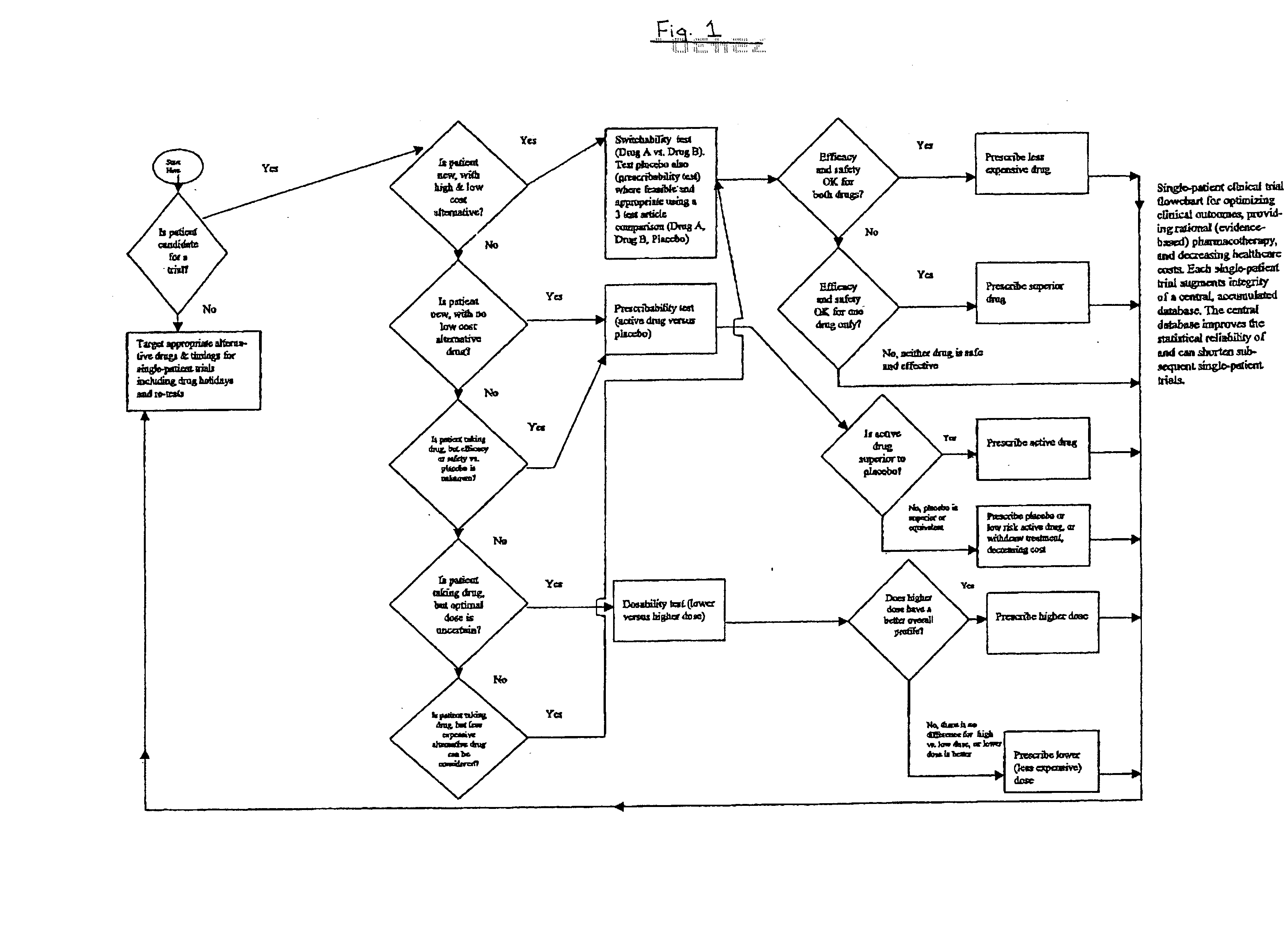Single-patient drug trials used with accumulated database: genomic markers
a single-patient drug and database technology, applied in the field of single-patient drug trials using accumulated database : genomic markers, can solve the problems of inability to accurately predict the safety and effectiveness of a medication for individuals actually treated, inability to accurately predict the safety and effectiveness of a medication, and inability to accurately predict the safety and effectiveness of a drug for individuals
- Summary
- Abstract
- Description
- Claims
- Application Information
AI Technical Summary
Benefits of technology
Problems solved by technology
Method used
Image
Examples
example 2
[0188] The kit described in Example 1 is used to again evaluate the usefulness of methylphenidate (Ritalin) treatment in a hyperactive child except that all interested parties have the benefit of a set of data generated from a pool of patients having a similar need for treatment. The trial calls for 40 mg to be given daily as 10 mg four times daily compared to identical appearing placebo which is also given four times daily. After completing the trial and questionnaire, the data is processed to statistically determine the results. The results are provided as follows:
[0189] the patient's attention span is observed to have improved substantially during the periods in the trial when the methylphenidate is being given;
[0190] temper outbursts are observed to increase slightly during placebo periods;
[0191] sleep patterns are observed to be statistically altered during methylphenidate periods; and
[0192] teacher comments corroborate improved attention span during methylphenidate dosing peri...
example 3
[0225] Test kit: Antihistamine for House Dust Induced Allergic Nasal Congestion.
[0226] A clinician writes a prescription for a test kit which has been extensively tested in patients similar to his. The product labeling available to the clinician advises him that it has been used in 2,000 patients with house dust allergic nasal congestion to date. The antihistamine is found to be clinically useful with a modest side effect profile in 1500 patients, 250 experience untoward drowsiness and 250 experience no clinical benefit. The test is completed and found useful only in subjects with an 8.sup.th grade educational level or higher who report at least moderate symptom on study initiation. Subjects with mild symptoms often fail to complete the study. The clinician recognizes that this patient is college educated with severe symptoms and writes the prescription, confident that he has a good candidate for the test.
example 4
[0227] The pharmaceutical company marketing an antihistamine submits a 2,000 patient database to the government for approval of a new claim for the product: house dust allergic nasal congestion. The company agrees with a request from the government agency that, as a condition for expedited review and acceptance, continuous post-marketing surveillance will be conducted for this indication by marketing the product in a SPAS test kit. This testing of each subject on initiation of therapy will continuously ensure that each patient is evaluated for appropriateness of treatment prior to commitment to a chronic regimen. In addition, it allows the company to provide a monthly update to the government of drug effectiveness and safety in the entire population using the product for house dust allergic nasal congestion. Physician and patient labeling is revised when necessary. Also, it is a way of finding out whether more side effects occur when the product is concomitantly taken with another d...
PUM
 Login to View More
Login to View More Abstract
Description
Claims
Application Information
 Login to View More
Login to View More - R&D
- Intellectual Property
- Life Sciences
- Materials
- Tech Scout
- Unparalleled Data Quality
- Higher Quality Content
- 60% Fewer Hallucinations
Browse by: Latest US Patents, China's latest patents, Technical Efficacy Thesaurus, Application Domain, Technology Topic, Popular Technical Reports.
© 2025 PatSnap. All rights reserved.Legal|Privacy policy|Modern Slavery Act Transparency Statement|Sitemap|About US| Contact US: help@patsnap.com


